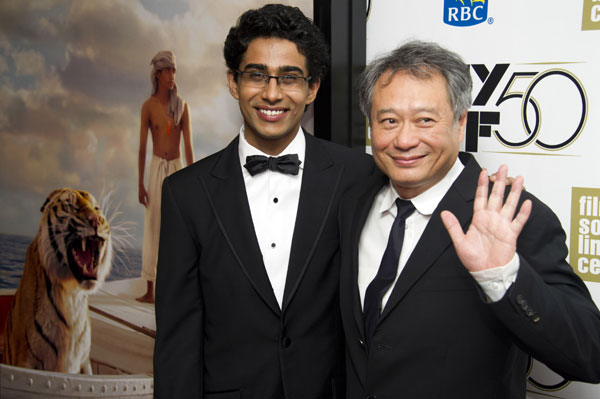Ang Lee breaks 'every rule' to make unlikely new Life of Pi film
Updated: 2012-09-30 08:06
By Sebastian Smith in New York (China Daily)
|
||||||||
|
Director Ang Lee (right) and actor Suraj Sharma attend the premiere of Life of Pi at the 50th annual New York Film Festival opening night gala on Friday in New York. Charles Sykes / Invision Via AP |
Director Ang Lee says he broke every rule in Life of Pi, which premiered on Friday, bringing the best-selling novel into stunning 3-D life with a production featuring an unknown Indian actor, four tigers and the world's biggest wave machine.
"There are a few classic advices in movies: Never make a movie featuring animals, kids, water or 3-D," the Taiwanese-born American director quipped at the premiere, which was the opening screening of the New York Film Festival in Manhattan. "We ignored all (of them)."
The filmmaker, who won Oscars for Brokeback Mountain and Crouching Tiger, Hidden Dragon, had to pull out all the stops to get Yann Martel's 2001 novel of the same name on screen.
The story, centered around a shipwrecked Indian boy called Pi who survives in a life raft with a Bengal tiger, posed obvious casting difficulties. The overriding theme of the search for God was also not standard Hollywood fare.
"I remember thinking to myself that no one in their right mind ... How do you sell this thing?" Lee recalled.
His first solution came in the guise of Suraj Sharma, a hitherto unknown 17-year-old from Delhi who tagged along with his brother to the audition, then found himself being picked out of 3,000 others.
"It was my brother. He had to go to the audition and I went with him," Sharma said at the premiere.
For the movie's other key ingredients, Lee cast his net even wider, creating a Hollywood-financed, but international production that sounds almost as fantastical as the story itself.
The first part of the film was filmed on location in Pondicherry, India, the picturesque former French colony where some 5,500 extras were hired for the sumptuous scenes of Indian street life and religious ceremonies.
Then, because the entire second half of the two-hour movie takes place at sea, Lee went to Taichung in his native Taiwan to film in a specially-designed wave-generating tank that measures 70 by 30 meters and contains 6.4 million liters of water. "We created our own Hollywood," Lee said.
The results are spectacular scenes that lend themselves especially well to the 3-D experience, with flying fish shooting out of the screen, and surrealist trips by the camera into a deep populated by luminous jellyfish and whales.
Having secured his human star and a number of backups, including a rude French cook played by Gerard Depardieu, Lee needed only to fill the main supporting role: The tiger.
The animal, who goes by the name Richard Parker, is mostly the creation of CG special effects. But the all-important physical references that provide a base for the wizardry were provided by four real tigers.
Animal trainer Thierry Le Portier, a veteran of big-cat scenes in Gladiator, found three of the animals in France and one in Canada.
According to Lee, a big male named King was the main model for Richard Parker, while two females, also from France, were used to model the movie tiger's more aggressive movements.
The "more docile" episodes, such as when Richard Parker is seasick, were modeled on the unusually cuddly Canadian tiger, Lee said.
Sharma, playing Pi, said the water tank in Taiwan "began to feel like my home" and that his research into being a castaway included consulting with shipwreck survivor and author of Adrift, Steve Callahan.
But his portrayal of the intimate connection between his scared character and the hungry tiger was all acted in front of an invisible beast.
"The boat was pretty empty," he laughed. "There was no tiger."
Early reviews described the film as Oscar potential thanks to its beauty and artistic use of 3-D.
"Summoning the most advanced digital filmmaking technology to deliver the most old-fashioned kind of audience satisfaction," Variety said.
But there were thumbs down over what some critics saw as the story's over-earnestness. "Torpid, preachy, faux high-minded and 'prestigious,'" said the Village Voice.
Agence France-Presse

 'Taken 2' grabs movie box office crown
'Taken 2' grabs movie box office crown
 Rihanna's 'Diamonds' tops UK pop chart
Rihanna's 'Diamonds' tops UK pop chart
 Fans get look at vintage Rolling Stones
Fans get look at vintage Rolling Stones
 Celebrities attend Power of Women event
Celebrities attend Power of Women event
 Ang Lee breaks 'every rule' to make unlikely new Life of Pi film
Ang Lee breaks 'every rule' to make unlikely new Life of Pi film
 Rihanna almost thrown out of nightclub
Rihanna almost thrown out of nightclub
 'Dark Knight' wins weekend box office
'Dark Knight' wins weekend box office
 'Total Recall' stars gather in Beverly Hills
'Total Recall' stars gather in Beverly Hills
Most Viewed
Editor's Picks

|

|

|

|

|

|
Today's Top News
Health new priority for quake zone
Xi meets US top military officer
Japan's boats driven out of Diaoyu
China mulls online shopping legislation
Bird flu death toll rises to 22
Putin appoints new ambassador to China
Japanese ships blocked from Diaoyu Islands
Inspired by Guan, more Chinese pick up golf
US Weekly

|

|








